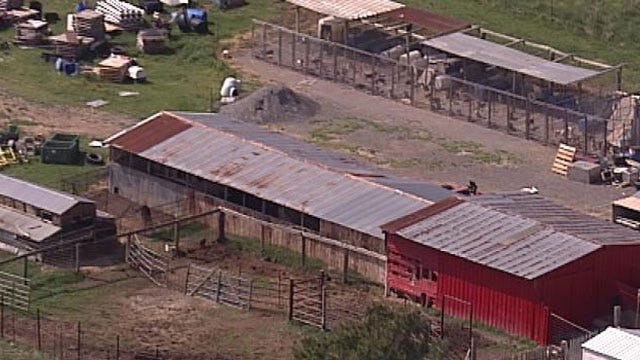Oklahoma Pet Breeders' Taxes Questioned
Dog breeders are taking their fight to a new level as the state looks to regulate their industry for the first time in history. <br /><br /><a href="http://www.newson6.com/story/14230741/puppy-mill-bill-faces-another" target="_self">Puppy Mill Bill Faces Another Last-Minute Challenge</a>Tuesday, April 26th 2011, 10:00 pm
Jennifer Loren, Oklahoma Impact Team
OKLAHOMA CITY-- Dog breeders are taking their fight to a new level as the state looks to regulate their industry for the first time in history. The new rules are set to go into effect the first of July, but many are still fighting tooth and nail to stop them.
Some breeders have threatened to use violence if they don't like the regulations that ultimately go into place. Meanwhile, some legislators and regulators are calling the breeders' tax histories into question.
"If those sorts of things start to happen... yes there will be violence," said Misty Fields, an attorney for more than 100 breeders fighting the new regulations.
[A Brief History: Oklahoma legislators passed the law that formed the regulating board in the 2010 legislative session. Members of the Commercial Pet Breeders Board were seated and have worked over the last year to create the state regulations by which breeders will have to comply. Those rules have gone through public hearings and have been whittled down in negotiations with breeders. The rules set to be voted on now are what many call minimal industry standards. Before the rules can go into effect they must be approved by the House and Senate and signed by the Governor.]
5/06/2010 Related Story: Governor Signs Puppy Mill regulation Bill into Law
As the new regulations were approved by the House (90-5) Tuesday, the breeders' attorney, Misty Fields, says this fight has not been about dogs at all. It's about people and money.
"It's all about the money," said Fields.
We asked Fields what she thought about people who believe this law is about animal welfare and not about money.
Fields responded, "Animals don't have rights. People have rights."
Fields says the regulations could destroy her clients' lives if certain rules are approved.
"They stand to lose their business. They stand to lose their homes. They stand to lose their way of life," said Fields.
We asked her which rules, specifically, would put the breeders out of business. Fields listed three rules. Our research shows each of those rules were taken out of the proposal during negotiations. Fields argued that until the rules are signed by the Governor, she can't be sure what will be left in and what will be taken out. Therefore, she says, the possibility that her clients' livelihoods would be affected still exists.
[The Basics: The new rules would force Oklahoma breeders with eleven or more breeding females to get a license through the newly formed Commercial Pet Breeders Board. Those breeders would then be expected to meet certain standards for pet care and record keeping.]
Most of the breeders fighting the rules run huge operations breeding and sell puppies on a large enough scale to make a living. Some operations breed more than 200 dogs. Many of these breeders are already regulated by the US Department of Agriculture and don't want the state to get involved.
3/10/2011 Related Story: Puppy Mill Bill Faces Another Last-Minute Challenge
At a recent hearing at the capitol one breeder held up a copy of Adolf Hitler's "Mein Kampf" telling legislators the regulating board was trying to exterminate breeders. Misty Fields herself was kicked out of that same hearing after calling the integrity of the board into question and using profanity.
"It was just an example of the passion that came out that day. I made a promise to my clients that I would fight this to the bitter end… win lose or draw that I would be in this with them to the end," said Fields. She said she had a first amendment right to speak at the hearing and her rights were violated.
One of the people targeted in that hearing was Sue Ann Hamm, a Commercial Pet Breeders Board member and an advocate for animal welfare.
"Those are not business people. They're not Oklahoma business people, " said Hamm. "They're black market breeders and they proved it. And there's no response to that type of hysteria."
Hamm believes breeders willing to fight what she calls minimal regulations must have something to hide. She believes they're hiding money.
"We're paying a huge price for these breeders' greed," said Hamm.
Hamm and the other board members say Oklahoma is missing out on millions of dollars in sales tax revenue. They estimate the state is losing about $25 million in taxes each year because breeders are selling their pets on the black market.
We called the Oklahoma Tax Commission to find out if breeders are collecting and remitting sales tax on their puppies. But it turns out the OTC doesn't track dog breeders or their sales. So we tracked down some breeders' ourselves to see if they have tax IDs. We obtained a list of seven of the state's biggest breeders.
We researched their businesses online and found only two of the seven are registered with the state and have sales tax IDs.
Even then, the Oklahoma Tax Commission couldn't tell us if those breeders were remitting any taxes, only that they have a tax ID number. So we asked Fields, the breeders' attorney, if her clients are paying their taxes.
"I have not broached that subject with them and if I did, frankly I probably wouldn't tell you because that would be privileged information," said Fields.
Veterinarian and Representative Brian Renegar carried the rules through the House. He says, as a vet, he knows breeders are selling their puppies on the black market.
"Its the law," said Representative Renegar. "I mean if you sell a dog in the state of Oklahoma, you're supposed to collect a sales tax and pay it in."
Under the new regulations breeders would be forced to track their sales and turn their numbers into the state. Hamm and Renegar say that record keeping will keep breeders honest when it comes to taxes.
"What they would have to do is pay that seven percent sales tax. Seven percent of gross sales. That's a lot of money that they'll have to pay," said Hamm.
State legislators say they are being inundated with calls right now as the final regulations make their way through the House and Senate. If the rules pass both houses they'll go Governor Fallin's desk to be signed. If signed, breeders will have to apply for licenses in July.
More Like This
April 26th, 2011
April 15th, 2024
April 12th, 2024
March 14th, 2024
Top Headlines
April 26th, 2024














